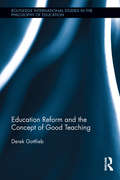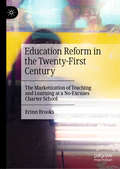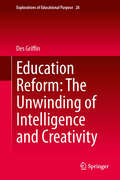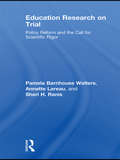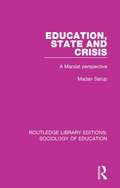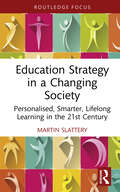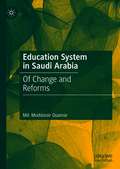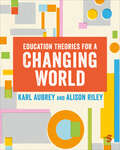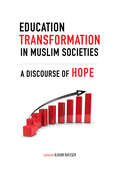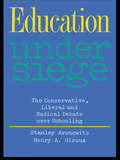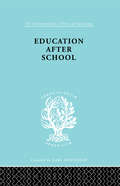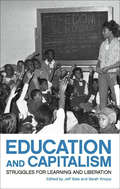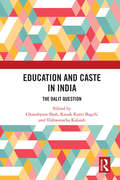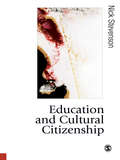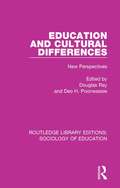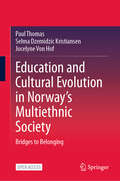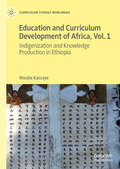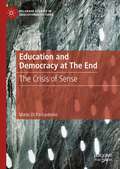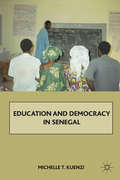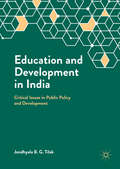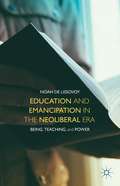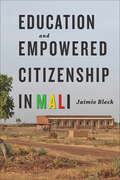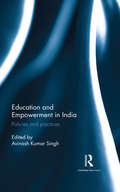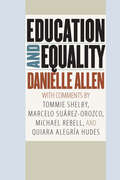- Table View
- List View
Education Reform and the Concept of Good Teaching (Routledge International Studies in the Philosophy of Education #34)
by Derek GottliebIn an effort to address the problems confronting the American education system, the Obama administration has issued structural and systematic reforms such as Race to the Top. These initiatives introduce new statistics and accountability systems to gauge what constitutes "good" teaching, both from an administrative standpoint and the perspective of teacher training programs. This volume offers a direct critique of this approach, concluding that it does not respond adequately to the issues of education reform but rather raises new problems and actively stymies progress. The author argues that at the heart of the confusion lies a misguided and rationalistic view of teaching and learning. He draws on the philosophical strategies of Ludwig Wittgenstein to break down the guiding assumptions of Race to the Top, allowing both the positive and the negative aspects of the policies to be heard. The author then proposes a different view of teaching and learning which considers how to effectively address the problems Race to the Top seeks to confront.
Education Reform in the Twenty-First Century: The Marketization of Teaching and Learning at a No-Excuses Charter School
by Erinn BrooksThis book explores how, why, and with what consequences one no-excuses charter network marketizes teaching and learning, through the author’s 1000 hours of covert participant observation at a network charter school. In her research, Brooks found that the “AAG” (pseudonym) network re-conceptualized teaching by urging staff to envision their careers in corporate education rather than in classroom teaching. While some employees received a boost up the corporate ladder, others found themselves being pushed out of the organization. Despite AAG’s equity-conscious discourse, administrators emphasized controlling student behavior as a central measure of teaching effectiveness. Brooks develops the concept of creative compliance to describe the most successful teachers’ tactics for adhering to formal policies strategically, bending the rules in order to survive and advance in a workplace fraught with competition and insecurity.
Education Reform: The Unwinding of Intelligence and Creativity
by Des GriffinThis book pays special attention to the impact that a student's early childhood and socioeconomic status has on his or her educational achievement. It argues that discussions of education reform need a broader scope, one that encompasses a student's background as well as standardized testing, merit pay for teachers, and other issues regarding the quality of the teaching and learning. Education Reform: the Unwinding of Intelligence and Creativity features cases and examples from schools in Australia, the USA, and Britain. It offers a breadth of coverage, from early childhood to effective teaching and learning to teacher pay and conditions, standardized testing and public and private (independent) schooling and universities as well as creativity. It also includes summaries of educational policies in many developed countries. Reforms which emphasize concern for early childhood, school leadership and respect for teachers are contrasted with ones based on standardized tests, private schools and sacking bad teachers.
Education Research On Trial: Policy Reform and the Call for Scientific Rigor
by Annette Lareau Pamela Barnhouse Walters Sheri H. RanisRead the author's commentary for the Teachers College Record here: http://www.tcrecord.org/Content.asp?ContentID=15915 It is not an exaggeration to say that the field of education has been under attack. Many, particularly in Washington, D.C., have proclaimed the research to be shoddy. They have called for new "scientific" standards for research. Randomized control trials have been promoted. In many of these discussions, the only criterion is making a more rational and scientific approach to education research. Since the federal government plays a leadership role in defining the terms of education debates, this critique is important. It stands to radically reshape research and possibly school priorities in the future. The essays in this book take up this important topic. They offer critical insight into how this debate came to flourish. Some of the authors take issue with core assertions of the debate; other are sympathetic. Taken together, they help to broaden and deepen our understanding of the efforts to revamp the field of education research and, ultimately education. The chapters also discuss the factors that facilitate, and impede, research from having an impact on policy. Teaching and Learning Goals Include: -- helps illuminate the relationship between education research and policy --critically examines key assumptions of federal legislation particularly the call for scientific rigor in the No Child Left Behind Legislation --helps students understand the broader intellectual context of this crisis in education
Education State and Crisis: A Marxist Perspective (Routledge Library Editions: Sociology of Education #47)
by Madan SarupFirst published in 1982, this work is a critical survey of contemporary educational debates and themes which took on new urgency and importance at the time. In particular, it explores the problematic nature of ‘progressive education’ and ‘discipline’; the changes in the labour process and youth unemployment; the nature of the state and its relationship with schooling; the growth of state intervention and the specific forms of discrimination suffered by women and black people. It argues that trends in education at the time can be explained by a Marxist analysis. It suggests that the changes taking place in schools and colleges were expressions of the contradictions of capitalism and of the state’s attempt to restructure education.
Education Strategy in a Changing Society: Personalised, Smarter, Lifelong Learning in the 21st Century (Routledge Advances in Sociology)
by Martin SlatteryPlacing the UK in a global context, this book engages with the emerging international debate on the future of education in the 21st century. It examines the post-pandemic paradigm shift in educational practice in countries around the world and presents international case studies of emerging future practice.However, while it embraces the global context and the mega-forces therein, it is specifically focused on the challenges for education in England today and the potential strategies for moving forward to the all-inclusive, personalised, smarter and lifelong learning needed for tomorrow. In doing so, it explores how the new curriculum models, new approaches to pedagogy and new educational technology, such as AI and even robotics, might help to transform education in England, help “level-up” learning and help younger generations cope not only with the future as we know it but also the future that we don’t.This book will appeal to policymakers, students and scholars interested in the sociology of education, education policy, international education, international development and future studies, as well as those with a general interest in Education in the future.
Education System in Saudi Arabia: Of Change and Reforms
by Md. Muddassir QuamarThis book is a comprehensive study on the education system of Saudi Arabia, placing the reforms and changes it has undergone in the past two decades within the context of the historical evolution of the education system. An education system cannot be seen in isolation of the society; it plays a significant role in shaping the individual, state and the society, that in turn, have a bearing on the education system and its evolution. Therefore, this book locates Saudi education in the backdrop of the changes in the society, how they have facilitated or hindered the education reforms and how the education reforms have impacted the society. The book does not ignore the immediate trigger for the beginning of a comprehensive reforms process but goes beyond it to find much deeper socio-political and economic rationales that paved the way for the reforms. It provides a nuanced understanding of the interplays of various socioeconomic as well as political factors that have shaped the education system in Saudi Arabia.
Education Theories for a Changing World
by Karl Aubrey Alison RileyHow can education be a vehicle for social change? This book looks at how different educational theories can be used to address complex and vital issues in society by exploring key concepts and challenging traditional thought through an educational lens. Each topic area is explored in both theoretical and practical terms with direct application to the classroom throughout. Key topics include: The climate crisis The Black Lives Matter movement The rise of right-wing populism The experience of LGBTQ+ students in school The impact of COVID-19 This is essential reading for anyone training to teach at any age phase and students undertaking the academic study of education.
Education Theories for a Changing World
by Karl Aubrey Alison RileyHow can education be a vehicle for social change? This book looks at how different educational theories can be used to address complex and vital issues in society by exploring key concepts and challenging traditional thought through an educational lens. Each topic area is explored in both theoretical and practical terms with direct application to the classroom throughout. Key topics include: The climate crisis The Black Lives Matter movement The rise of right-wing populism The experience of LGBTQ+ students in school The impact of COVID-19 This is essential reading for anyone training to teach at any age phase and students undertaking the academic study of education.
Education Transformation in Muslim Societies: A Discourse of Hope (Advancing Education in Muslim Societies)
by Shelley Wong Nuraan Davids Andreas M. Krafft Bassam Abu Hamad Mualla Selcuk Suhailah Hossien Sulieman Mleahat Nora El-Bilawi Sher Afgan Tareen Afeefa Syeed Tyron PittsHope is a complex concept—one academics use to accept the unknown while also expressing optimism. However, it can also be an action-oriented framework with measurable outcomes.In Education Transformation in Muslim Societies, scholars from around the world offer a wealth of perspectives for incorporating hope in the education of students from kindergarten through university to stimulate change, dialogue, and transformation in their communities. For instance, though progress has been made in Muslim societies on early education and girls' enrollment, it is not well documented. By examining effective educational initiatives and analyzing how they work, educators, policymakers, and government officials can create a catalyst for positive educational reform and transformation. Adopting strength-based educational discourse, contributors to Education Transformation in Muslim Societies reveal how critical the whole-person approach is for enriching the brain and the spirit and instilling hope back into the teaching and learning spaces of many Muslim societies and communities.Education Transformation in Muslim Societies is a copub with the International Institute of Islamic Thought.
Education Under Siege: The Conservative, Liberal and Radical Debate over Schooling (Critical Studies In Education)
by Henry A. Giroux Stanley AronowitzFirst published in 1987. Routledge is an imprint of Taylor & Francis, an informa company.
Education after School (International Library of Sociology #Vol. 4)
by C. StimsonFirst published in 1946. Part of the International Library of Sociology collection, this is a study on Education After School' a volume of the sociology of education subject area.
Education and Capitalism: Struggles for Learning and Liberation
by Jeff Bale Sarah KnoppEducators examine the state of public schooling, confront the anti-union stance of policymakers, and offer a bold new direction in this essay anthology.A conservative, bipartisan consensus dominates the discussion about what’s wrong with our schools and how to fix them. It offers “solutions” that scapegoat teachers, vilify unions, and impose a market mentality on education. In Education and Capitalism, teacher-activists expose the damaging limitations of this elite consensus and offer an alternative vision of learning for liberation.Co-editors Sarah Knopp and Jeff Bale presents a powerful defense of public education. Other contributors offer historical analysis of school reform with a focus on civil rights and union-led movements. Arguing that today’s schools are designed to serve the needs of capitalism rather than students, this volume offers an action plan for positive change.
Education and Caste in India: The Dalit Question
by Ghanshyam Shah Kanak Kanti Bagchi Vishwanatha KalaiahSeven decades since Indian Independence, education takes the centre stage in every major discussion on development, especially when we talk about social exclusion, Dalits and reservations today. This book examines social inclusion in the education sector in India for Scheduled Castes (SCs). The volume: · Foregrounds the historical struggles of the SCs to understand why the quest for education is so central to shaping SC consciousness and aspirations; · Works with exhaustive state-level studies with a view to assessing commonalities and differences in the educational status of SCs today; · Takes stock of the policymaking and extent of implementations across Indian states to understand the challenges faced in different scenarios; · Seeks to analyse the differential in existing economic conditions, and other structural constraints, in relation to access to quality educational facilities; · Examines the social perceptions and experiences of SC students as they live now. A major study, the volume will be of great interest to scholars and researchers of education, sociology and social anthropology, development studies and South Asian studies.
Education and Cultural Citizenship (Published in association with Theory, Culture & Society)
by Nick StevensonThis dynamic, energetic book systematically brings together the major developments in the social and political theory of education. It offers a global introduction to the major debates within the field and provides a sustained argument for a democratic and normative view of education. Stevenson provides a comprehensive view of the major disputes within social, cultural and political approaches to education. Drawing upon varied critical traditions the book helpfully connects these diverse threads of debate whilst exploring the work of key theorists. Areas explored include: * democratic notions of education, * cosmopolitanism * multiculturalism * pragmaticism * critical pedagogy * democratic socialism * liberalism * politics of fear Clearly written and passionately argued this book will be essential reading for all those interested in exploring education's changing place in society.
Education and Cultural Differences: New Perspectives (Routledge Library Editions: Sociology of Education #44)
by Douglas Ray Deo H. PoonwassieFirst published in 1992, this book looks at the interaction between ideals and reality, with the focus upon social inequality and education in modern society, as well as the possibilities for education to lessen the related problems. The essays in this volume examine three forms of inequality in global society: aboriginal societies in modern industrial states; long-established communities that have been denied full status; and differences arising from recent population migrations. In doing so, it considers how education might support the efforts of all members of society to pursue the goal of equal status for all.
Education and Cultural Evolution in Norway’s Multiethnic Society: Bridges to Belonging
by Paul Thomas Selma Dzemidzic Kristiansen Jocelyne Von HofThis open access volume explores the complex dynamics of ethnic and racial segregation in Norwegian schools, particularly in Oslo. It examines how educational institutions can reflect and challenge societal norms regarding race, culture, and identity. The book argues that while Norway pursues an egalitarian ethos, recent trends in school segregation undermine these ideals. The major contribution of this book lies in its critical exploration of the intersectionality of race, culture, and education, grounded in critical pedagogy principles. Through case studies, personal narratives, and literary analyses, the authors highlight how marginalized students navigate their identities within systems that often stigmatize them. Topics include authentic multicultural education, the reclamation of space and identity by non-white students, and the examination of “ghetto schools” as sites of both challenge and empowerment. Special features include visual illustrations and engaging literary analyses. Ultimately this volume serves as a compelling call for educational reform and cultural dialogue, emphasizing the transformative potential of education in promoting social justice and community cohesion.
Education and Curriculum Development of Africa Vol. 1: Indigenization and Knowledge Production in Ethiopia (Curriculum Studies Worldwide)
by Woube KassayeThis book, the first of two volumes, focuses on the conceptualization of Indigenous Knowledge and Curriculum, Ethiopian/African Philosophy and the possibilities of Indigenization/Africanization of African Education. Its main purpose is to overview the practices of traditional/indigenous education of Africa with emphasis on Ethiopia’s experience connected with curriculum development, and make possible suggestions that could contribute to curriculum development endeavors of Africa. The cultural heritage of the majority African countries is either ignored or not adequately considered in the formulation of educational policies and curricula in their modern African educational systems. Hence, a new path and paradigm shift are needed. To this end, considering Africa's outstanding IK with useful experiences of other countries in education particularly in the curriculum is critical to bring the required change.
Education and Democracy at The End: The Crisis of Sense (Palgrave Studies in Educational Futures)
by Mario Di PaolantonioThis book grapples with what it means when education and democracy are at an end: when these two foundational aspects of our society seem to have reached a culminating point, no longer appearing to produce and make sense amid the crises of our time. Engaging topical political events and mobilizing a variety of cultural resources, Di Paolantonio shows that today the possibility of the future and the significance of an expansive transgenerational sensibility are radically in question as trends toward destruction, cruelty, and banality are steering world-defying calamities, and sparking “chronopathologies” of doom and despair among the planet’s occupants. Unfolding his argument through a series of accessible chapters that draw on contemporary philosophy, educational thinking, and cultural-artistic works, Di Paolantonio explores how the transgenerational sensibility retains a possibility we might tap for overcoming the impasses of our time.
Education and Democracy in Senegal
by Michelle T. KuenziThis book examines the role of non-formal education (NFE) in promoting democracy in Senegal.
Education and Development in India: Critical Issues In Public Policy And Development
by Jandhyala B.G. TilakDrawing on empirical, interdisciplinary research, this book presents a critical review of some of the major issues that are of interest to researchers, policymakers and planners in developing as well as advanced countries, including specifically in India. It provides an in-depth review of some of the major development policy issues in education in general, and in India in particular, over the past 2-3 decades. Besides presenting an overview of the educational developments in India that reflects issues such as growth, equity, efficiency, foreign aid, decentralization, center-state relations, financing, and cost recovery, the book puts forward in-depth analyses of education poverty, interrelations between education and poverty, low level of outcomes in elementary education, effects of structural adjustment policies and approaches on education, south-south cooperation, etc. It also critically discusses changes in policies relating to financing higher education, external assistance for education, and how the growth of private higher education is affecting society at large. The dichotomy between public policy and action is also highlighted in many chapters. On the whole, while the importance of education is being increasingly recognized, the state does not seem to be as willing to foot the bill for education as the households and even the private sector. Occasionally contrasting with international evidence on, for example, financing higher education, private higher education, or the effects of neo-liberal policies, the book offers an interesting read for a wider audience.
Education and Emancipation in the Neoliberal Era
by Noah De LissovoyThis book describes how neoliberalism as societal philosophy works to limit human potential in our school systems. Analyzing contemporary school reform and control, punishment, and pathologization in schools, this book outlines a theory of emancipation and a process by which pedagogy can build solidarity in classrooms and society more broadly.
Education and Empowered Citizenship in Mali
by Jaimie BleckExplores the connections between access to education and political engagement in Mali.Primary school enrollment has nearly tripled in Mali since 1991, when the country made its first transition to multiparty democracy. Jaimie Bleck explores the effect of this expanded access to education by analyzing the relationship between parents’ and students’ respective experiences with schooling and their current participation in politics. In a nation characterized both by the declining quality of public education and by a growing number of accredited private providers, does education contribute substantially to the political knowledge and participation of its citizens? Are all educational institutions (public and private, Islamic and secular) equally capable of shaping democratic citizens?Education and Empowered Citizenship in Mali is informed by Bleck’s original survey of one thousand citizens, which she conducted in Mali before the 2012 coup d’état, along with exit polls and interviews with parents, students, and educators. Her results demonstrate conclusively that education of any type plays an important role in empowering citizens as democratic agents. Simply put, students know more about politics than peers who have not attended school. Education also appears to bolster participation of parents. Bleck finds that parents who send their children to public school are more likely to engage in electoral politics than other Malian citizens. Furthermore, Bleck demonstrates that increasing levels of education are associated with increases in more engaged forms of political participation, including campaigning, willingness to run for office, and contacting government officials.
Education and Empowerment in India: Policies and practices
by Avinash Kumar SinghThis book explores the critical linkages between education and empowerment of women, marginalized groups and other disadvantaged sections of society. It: Provides an overview of educational policies and practices from India’s independence to the present day, and tracks relevant changes and amendments. Examines a range of issues connected with education such as the Right to Education Act; empowerment and community mobilization; higher education challenges and other emerging topics. Brings together both theoretical postulates and empirical findings.
Education and Equality
by Danielle AllenAmerican education as we know it today--guaranteed by the state to serve every child in the country--is still less than a hundred years old. It's no wonder we haven't agreed yet as to exactly what role education should play in our society. In these Tanner Lectures, Danielle Allen brings us much closer, examining the ideological impasse between vocational and humanistic approaches that has plagued educational discourse, offering a compelling proposal to finally resolve the dispute. Allen argues that education plays a crucial role in the cultivation of political and social equality and economic fairness, but that we have lost sight of exactly what that role is and should be. Drawing on thinkers such as John Rawls and Hannah Arendt, she sketches out a humanistic baseline that re-links education to equality, showing how doing so can help us reframe policy questions. From there, she turns to civic education, showing that we must reorient education's trajectory toward readying students for lives as democratic citizens. Deepened by commentaries from leading thinkers Tommie Shelby, Marcelo Suárez-Orozco, Michael Rebell, and Quiara Alegría Hudes that touch on issues ranging from globalization to law to linguistic empowerment, this book offers a critical clarification of just how important education is to democratic life, as well as a stirring defense of the humanities.
